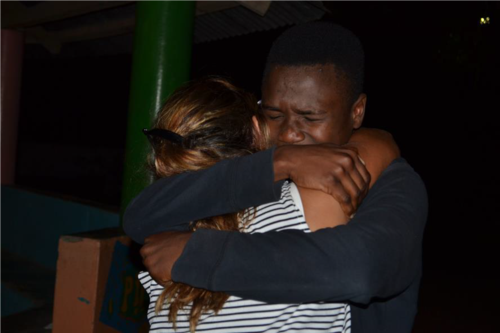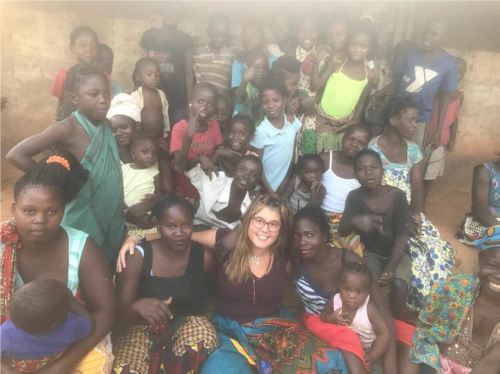Well, how should I start this witness? Words fail me to describe the whirlwind of emotions I felt, and the homesickness that is already pervading my heart. I waited days and even weeks to start writing this witness, at times out of fear, at times out of nostalgia. Each day I spend away from that land, I feel pain, but above all I feel homesick. It is something that come over me without asking to be allowed in, and determines how I feel, up to the point of dictating my dreams when I go to bed. I can’t describe what I lived, shared, loved, and above all what I have received. I loved and still love these folks as if they were family. Sincerely, how could I not? I was adopted and cuddled by all those who crossed my path, even though we were not speaking the same language, but this did not stand in the way of constant signs of love. In one of the visits to the barrio near the mission house I met a woman who immediately invited me to “mata-bichar” (have breakfast with them. When I realized it, I was surrounded by people who were watching me with great kindness trying to teach me their customs. My heart was shaken daily by the hospitality and love I felt, and by how we looked at one another and embraced with passion. I was at home.
I feel and think as I did when I stepped on that land for the first time and I cannot hold back my tears. The excitement to start, to know, to be, to help was such that the following Monday, two days after our arrival, I showed up to work at the ITIC. The night before I had hardly slept because of fear. I was wondering whether I would be able to deal with the kids who would show up in the infirmary to ask for help, whether all that I learned at the university would actually work, and whether I could adapt to the means at hand. There were many “Ifs,” insecurities, but of one thing I was sure, that I would give the best of myself from morning to evening.
I organized papers, reorganized the prescriptions shelves, but above all I dealt with the students in all their needs. I gave myself without fear, I remained after hours in that cubicle within those four walls, and filled my heart. I was always surprised when the students would look for me just to say Hi, to “give me a happy day,” as they would say.
The way I connected with those boys was indescribable, as if with a simple gaze we had established a pact of mutual protection. I felt intensely the illnesses and worries of each one, and dealt with each one as if they were the only ones, with all the love I could hold in my breast. Many times, when some of them were sick and had to sleep in the infirmary, it cost me to go home. I couldn’t think of anything else except of ways to make them get better rapidly. Very often I spent afternoons with them, playing games on the cold floor of the infirmary, taking their temperature every 30 minutes, or simply watching them sleep.
Some days were easier than others, but all of them were a constant challenge. Each day He helped me survive and realize that our obstacles only exist in our head. Very often I felt disoriented and knelt before Him, and He spoke to my heart showing me how he would overcome my difficulties.
One of the many situations I lived was the first time I saw the faces of those girls I was going to help in their studies. Each gaze entered my heart so intensely that I will never forget them. They were trying to learn by themselves, without books or anyone explaining things. They were motivated by an indescribable interior strength for wanting to be more, to reach a better future. Each one carried in her eyes stories and experiences that I will never forget, but always with a contagious joy and love.
I had the opportunity to help in the community clinic and there I understood that I belong to those people. I went for too much time avoiding to confront the health situation of the Makua and the pain it would give me. But in the end I rolled up my sleeves and went. I simply went. I covered all the branches, from the HIV patients, to the women patients with still undisclosed diseases, the maternity, the pediatric ward, ending with the TB department. I knew I was placing my health at risk, but I was sure of one thing, He was watching over me, and so I would not let this fear interfere with my helping people.
Endless lines would form at the entrance of the center, the screams of the children filled the corridors, and everyone awaited their turn. At times, language was a barrier in explaining how to take a prescription and the care that was needed, but I always made an effort to convey the message. I thank God who gave me strength daily in order to be able to help those people in need, and because a feeling of powerlessness never took over me.
With each passing day, the ties were growing stronger and my anxiety about returning home was constant. I knew that my place was there, that I belonged to them. This is the family God chose for my mission. And I loved them more every day, so that it was impossible to say good-bye without promising that I would return. With all my heart I am grateful for how they received me and for the love they gave me.
The best of this mission was not only the people I met, the smiles I saw, and the tears I shed, but also how God took over my heart daily without my knowing it. The need to talk daily with Him, was an intrinsic part of my routine, and the kind way He answered me was beyond description. I am sure that, without Him, I could not put up with my weaknesses or avoid my anxieties. How beautiful it was to discover God in this way!
Thank you, Carapira, simply thank you!






